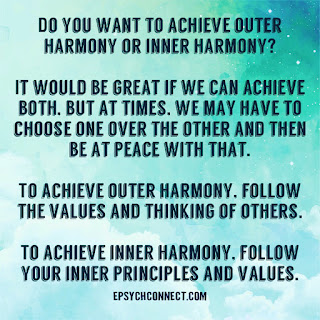Part of counseling is to help folks to understand self, and to fully accept self, the good and the bad.
Are you an “inner compass” person or an “outer compass” person?
In other words....
1. Do you tend to make decisions or take actions based on your own inner feelings, principles/values (inner compass) OR
2. Do you tend to make decisions or take actions based on the feelings, principles/values of others (outer compass)?
Each has its pros and cons.
The “outer compass” folks are great at trying to create outer harmony by pleasing others, making them happy, being pragmatic, trying to fit in, but if excessive, they can “lose themselves” in the process. This can create a lot of inner disharmony and unhappiness. Some may refer to this as “moral injury” in some context.
The “inner compass” folks are very good at knowing who they are, and living life true to who they are. However, if one is not careful, it can create a lot of friction for themselves if the outer compass is too different to the inner compass, leading to maladaptation.
In counseling, we often see the “extreme outer compass” folks, and the “extreme inner compass” folks. Outer compass folks have to learn to be a bit more inner compass, and the inner compass folks have to learn to be a bit more outer compass perhaps, in order to adapt better.
Which one are you bias towards? The inner compass or the outer compass?
Have you ever gone from one extreme to the other? Have you ever been able to find that elusive sweet spot, in order to balance your inner and outer compass? How can you learn to be more of one or the other?
I often view it like left handedness and right handedness. The reality is that we all use both “inner and outer compasses”, but there may be a bias towards one over the other.
School and parenting expect us to be more outer compass as a general rule. So I often see those children with “extreme inner compass” struggle here, leading to adjustment issues with fight/flight stress responses, which then may lead to a number of diagnoses, including ASD, ODD etc. “Extreme outer compass” kids are vulnerable at school too, especially with peer pressure, and if they find themselves in the “wrong crowd”. They are also more vulnerable to the judgement of others.
For those with a partner, your partner will tend to be the opposite. So naturally, you will learn the opposite, although it can be quite annoying, as this may not be your natural tendency. Inner compass folks will be perplexed at why the outer compass folks worry about what other thinks, and outer compass folks are perplexed at why the inner compass folks are so stubborn.
Furthermore, when one is experiencing a negative outcome from following the outer compass, one can make a “sharp switch” to the inner compass in a more reactive way. This may cause problems. Of course, this can also be done in a more healthy, intentional way, through skills in Acceptance Commitment Therapy (ACT).
One can use inner compass effectively, or ineffectively. The same as the outer compass. If one use the outer compass in the wrong way, it can seem “out of context” or unauthentic. If one uses the inner compass in the wrong way, it can come across entitled or selfish.
Acceptance Commitment Therapy (ACT) focuses more on the inner compass. What’s our values, and how can we take committed actions towards these values. Empathy training and social skill training are a little more about the “outer compass” perhaps. To do well in life, we need both don’t we? Having said that, life is a team sport. As long as we have those elements in our team, we don’t have to do or be everything, although there needs to be awareness and appreciation.












